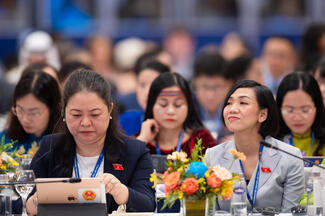- ImpactWe help parliaments to become greener and to implement the Paris agreement.We support democracy by strengthening parliamentsWe work to increase women’s representation in parliament and empower women MPs.We defend the human rights of parliamentarians and help them uphold the rights of all.We help parliaments fight terrorism, cyber warfare and the proliferation of weapons of mass destruction.We encourage youth participation in parliaments and empower young MPs.We support parliaments in implementing the SDGs with a particular focus on health and climate change.
- ParliamentsNearly every country in the world has some form of parliament. Parliamentary systems fall into two categories: bicameral and unicameral. Out of 190 national parliaments in the world, 78 are bicameral (156 chambers) and 112 are unicameral, making a total of 268 chambers of parliament with some 44,000 members of parliament. IPU membership is made up of 180 national parliaments
Find a national parliament
We help strengthen parliaments to make them more representative and effective. - EventsVirtual eventThe International Court of Justice (ICJ) was constituted under the United Nations Charter to help nations settle disputes peacefully in accordance with international law.
- Knowledge
Discover the IPU's resources
Our library of essential resources for parliamentsGlobal data for and about national parliamentsLatest data and reports about women in parliamentResolutions, declarations and outcomes adopted by IPU MembersRecent innovations in the way parliaments workThe latest climate change legislation from the London School of Economics' database
Gender-sensitive parliaments
Gender equality is in the interest of both men and women, and a precondition for genuine democracy. But for many years, the responsibility of defending women’s rights and gender equality in parliaments rested mainly on the shoulders of women MPs. We have now shifted the focus of that responsibility to parliaments, as institutions representing the interests of all citizens.
Many parliaments are moving away from their traditional male-dominated membership towards promoting equality. Making that change often involves critically examining the institution itself, acknowledging unseen barriers that deter the presence of women, limit their participation or hinder progress towards gender equality, and then taking strong action to address these issues.
We introduced the concept of gender-sensitive parliaments after conducting innovative research in 2010. We define them as institutions that are founded on gender equality, where women and men have an equal right to participate without discrimination or recrimination.
Parliaments ought to be places that meet the requirements of both women and men in the way they are run and structured, and where women not only can work, but also want to work. They should be family-friendly environments, where men and women find that their needs to live as well as work are taken into account. They also ought to be places where sexist language or behaviour is not tolerated.
We argue that by being sensitive to gender issues and favouring equal participation of women and men, parliaments are also more likely to achieve gender equality in society and to fulfil their democratic mandate. Parliaments that embody and promote gender equality deliver better to constituents and are more legitimate.
Based on our research findings, in 2012 IPU member parliaments unanimously adopted a Plan of Action for Gender-Sensitive Parliaments.
Gender-sensitive parliaments have seven key characteristics that make them modern, dynamic places that fully reflect the populations they serve. Being sensitive to gender makes parliaments efficient, effective and legitimate. Our self-assessment tool for gender-sensitive parliaments can help them achieve this.





